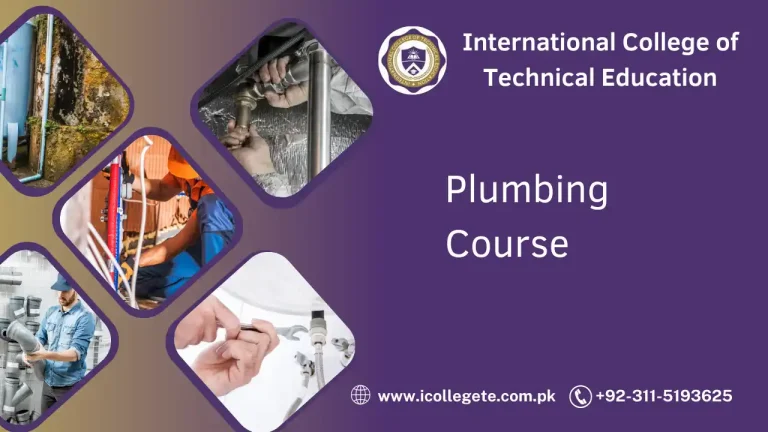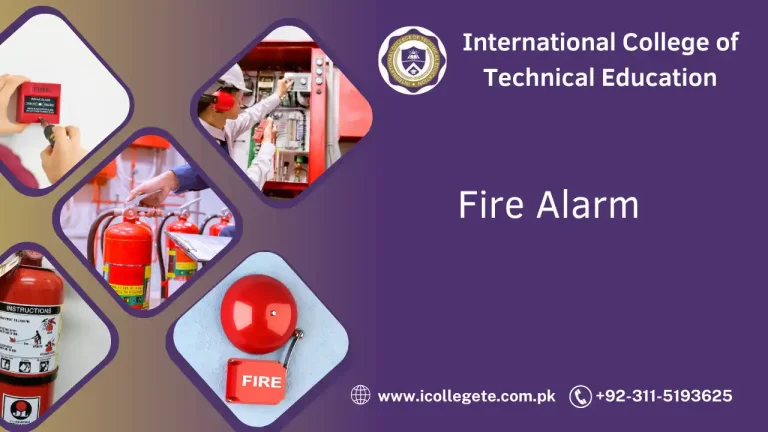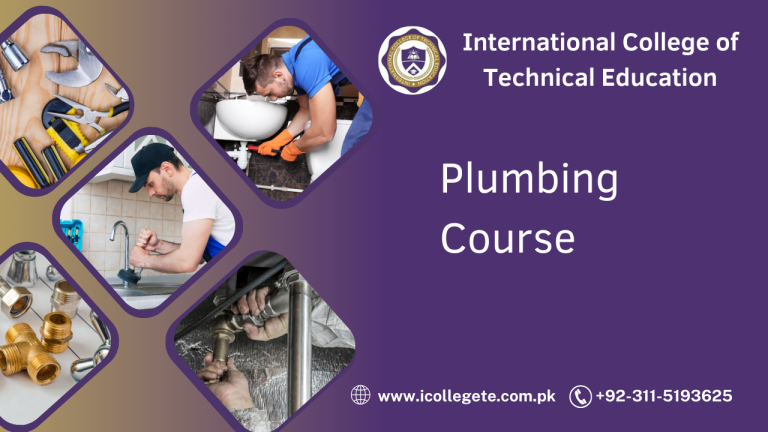In the modern mechanical engineering industry, ensuring the highest standards of quality is essential for safety, efficiency, and longevity. Whether it’s manufacturing machinery, automotive systems, or industrial equipment, mechanical engineers and technicians must consistently maintain quality assurance practices throughout the design, production, and testing stages.
The course is designed for anyone interested in the mechanical engineering field, specifically focusing on quality assurance, testing, and inspection techniques. With hands-on experience, the Quality Control Mechanical Course in Chakwal prepares participants to become proficient in applying quality control methods to mechanical components and systems, ensuring that products meet the necessary standards and specifications.
The Quality Control Mechanical Course in Chakwal aims to provide participants with an in-depth understanding of quality control principles and techniques in mechanical engineering. The course will cover the entire lifecycle of mechanical products, from design and manufacturing to assembly and maintenance, emphasizing the importance of quality assurance in each stage. Participants will learn about various quality tools, testing methods, inspection processes, and standards relevant to the mechanical industry.
By the end of the course, students will be equipped to manage quality control systems, identify defects, implement improvements, and contribute to the overall efficiency and safety of mechanical systems and components.
Course Overview
The Quality Control Mechanical Course in Chakwal offers a structured and comprehensive approach to understanding quality management in mechanical engineering. The course delves into the key areas of mechanical systems, quality control principles, and industry standards. It also covers the use of modern tools and techniques for inspecting, testing, and improving mechanical systems to ensure that they meet industry specifications and customer requirements.
With a focus on real-world applications, the course provides practical knowledge and skills that can be applied immediately in a variety of mechanical engineering sectors, including automotive, manufacturing, construction, and more.
Study Units
The Quality Control Mechanical Course in Chakwal is broken down into the following study units:
- Introduction to Quality Control in Mechanical Engineering
- What is Quality Control (QC) in mechanical engineering?
- Importance of QC in mechanical systems and products
- Key principles of quality control and assurance
- Overview of industry standards and regulations (ISO 9001, ASME, etc.)
- Mechanical System Components and Materials
- Overview of common mechanical components: gears, bearings, shafts, etc.
- Understanding the materials used in mechanical systems: metals, composites, plastics
- Material properties and their impact on product performance
- Importance of selecting the right materials for mechanical designs
- Quality Control Tools and Techniques
- Introduction to quality control tools: calipers, micrometers, Vernier gauges, etc.
- Measuring and testing mechanical components
- Statistical process control (SPC) for mechanical systems
- Techniques for identifying defects and faults in mechanical systems
- Inspection and Testing of Mechanical Systems
- Methods for inspecting mechanical components: visual inspections, non-destructive testing (NDT), dimensional measurements
- Advanced testing techniques: ultrasonic testing, X-ray inspection, magnetic particle testing
- Conducting functional tests on mechanical products
- Recording and analyzing test results to determine quality compliance
- Failure Analysis and Root Cause Investigation
- Understanding mechanical failures and their causes
- Root cause analysis techniques (Fishbone diagram, 5 Whys)
- Implementing corrective actions to prevent future failures
- Case studies of common mechanical failures and their resolution
- Quality Assurance and Continuous Improvement
- The role of continuous improvement in mechanical engineering
- Implementing process improvement methodologies: Lean, Six Sigma
- Quality assurance strategies to ensure long-term reliability and performance
- Designing quality control programs for mechanical engineering projects
- Compliance with Industry Standards and Regulations
- Overview of key mechanical engineering standards: ASME, ASTM, ISO
- Compliance with safety standards and regulations (OSHA, CE marking)
- Documentation and reporting for quality audits
- How to prepare for and pass quality assurance audits in the mechanical sector
- Quality Control in Manufacturing and Production
- Managing quality control in mechanical product manufacturing
- Applying QC methods during production processes
- Identifying production line inefficiencies and improving quality
- Role of quality control in supply chain management
Learning Outcomes
Upon completing the Quality Control Mechanical Course in Chakwal, participants will be able to:
- Understand the essential principles of quality control in the mechanical engineering field.
- Apply various inspection and testing techniques to ensure mechanical components meet quality standards.
- Implement root cause analysis techniques to identify and resolve defects in mechanical systems.
- Use industry-standard tools and equipment for measuring and testing mechanical products.
- Design and manage quality control programs within manufacturing and mechanical engineering environments.
- Conduct audits and maintain documentation for quality assurance processes.
- Ensure compliance with national and international mechanical engineering standards and regulations.
- Contribute to continuous improvement initiatives to enhance mechanical product quality and reliability.
Course Benefits
- Practical Skills: The course provides hands-on training and real-world applications, allowing students to apply their knowledge directly in mechanical engineering settings.
- Industry-Relevant Knowledge: Learn about current quality control tools, techniques, and standards that are critical in the mechanical engineering industry.
- Career Growth: With the increasing demand for quality control professionals in mechanical engineering fields, this course opens up various career opportunities for graduates.
- Problem-Solving Capabilities: Develop strong analytical and problem-solving skills to identify and address quality issues in mechanical systems.
- Enhanced Employability: Graduating with a recognized certificate in quality control for mechanical systems enhances your profile and makes you more competitive in the job market.
- Networking Opportunities: Interact with industry experts, instructors, and fellow professionals, building a network that can aid in career advancement.
Who is This Course For?
The Quality Control Mechanical Course in Chakwal is ideal for:
- Mechanical Engineers: Professionals looking to specialize in quality control and enhance their expertise in mechanical system management.
- Quality Control Inspectors: Individuals already working in quality control who want to expand their knowledge in mechanical engineering applications.
- Manufacturing Engineers: Those involved in production processes who want to implement effective quality control systems.
- Technicians and Technologists: People working in maintenance, repairs, and mechanical installations who wish to improve their understanding of quality control processes.
- Project Managers: Individuals managing mechanical projects who need to ensure that all mechanical systems meet quality standards.
- Graduates and Aspiring Professionals: Students who are looking to launch a career in mechanical engineering with a strong focus on quality control.
Future Progression
Upon successful completion of the Quality Control Mechanical Course in Chakwal, graduates can pursue various career paths, including:
- Quality Control Engineer: Work in the manufacturing or automotive sectors, ensuring mechanical products meet strict quality standards.
- Mechanical Testing Specialist: Specialize in testing mechanical components and systems to ensure their performance and compliance.
- Manufacturing Process Manager: Oversee production lines and quality control operations, ensuring efficient and high-quality output.
- Maintenance Supervisor: Manage maintenance activities, ensuring that all mechanical systems function correctly and meet quality standards.
- Compliance Officer: Ensure that mechanical products and systems comply with relevant regulations and standards.
- Quality Assurance Consultant: Provide expert advice to organizations seeking to implement or improve quality control practices in their mechanical operations.
The Quality Control Mechanical Course in Chakwal is an excellent opportunity for professionals looking to advance their careers in mechanical engineering, particularly in quality control. By mastering the principles and tools of quality management, participants will be equipped to ensure that mechanical systems and products are safe, efficient, and meet the highest standards of performance. Whether you are just starting your career or aiming to specialize in mechanical quality control, this course will provide the knowledge and skills needed to succeed in a competitive industry.







